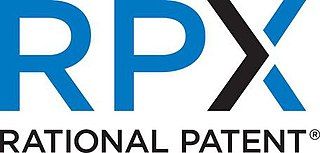Intellectual Ventures is an American private company that centers on the development and licensing of intellectual property. Intellectual Ventures is one of the top-five owners of U.S. patents, as of 2011. Its business model has a focus on buying patents and aggregating them into a large patent portfolio and licensing these patents to third parties. The company has been described as the country's largest and most notorious patent trolling company, the ultimate patent troll, and the most hated company in tech.

Acacia Research Corporation, founded in 1993, is an American company based in Newport Beach, California. Acacia partners with patent owners such as inventors and universities to license patents that are infringed. Roughly, 95% of the company's business involves licensing infringed patents on behalf of patent owners to some of the world's largest corporations through patent litigation.
Open Invention Network (OIN) is a patent non-aggression community that supports freedom of action in Linux as a key element of open source software. OIN acquires patents and licenses them royalty-free to its community members who, in turn, agree not to assert their own patents against Linux and Linux-related systems and applications.
A patent holding company (PHC) exists to hold patents on behalf of one or more other companies but does not necessarily manufacture products or supply services based upon the patents held.
Opposition to software patents is widespread in the free software community. In response, various mechanisms have been tried to defuse the perceived problem.
Allied Security Trust (AST) is an independent, not-for-profit cooperative that provides its Members with a highly efficient, cost-effective method of mitigating the risk of patent assertions and litigation by enabling Members to secure patent rights by collectively purchasing assets available on the open market.
Defensive patent aggregation (DPA) is the practice of purchasing patents or patent rights to keep such patents out of the hands of entities that would assert them against operating companies. The opposite is offensive patent aggregation (OPA) which is the purchasing of patents in order to assert them against companies that would use the inventions protected by such patents and to grant licenses to these operating companies in return for licensing fees or royalties. OPA can be practiced by operating companies or Non-Practicing Entities (NPEs)
Trademark troll is a pejorative term for any entity that attempts to register a trademark without intending to use it and who then threatens to sue others who use that mark. As a traditional troll is said to collect a toll from those trying to cross a bridge, a trademark troll "magically appears when an unsuspecting producer adopts the same or similar mark and poses upon them two choices: pay to get a license to use my mark or litigate".
Article One Partners (AOP) is an online prior art search and intellectual property research crowdsourcing community. AOP was acquired by RWS Group in October 2017 and the AOP Connect crowdsourcing platform is now part of the IP Research group within RWS. RWS IP Research provides crowdsourced prior-art-search services by utilizing an online research community. The company's President stated that, as of June 30, 2018, AOP comprises "more than 40,000 in over 170 countries."
Lodsys, LLC was a patent company located in Marshall, Texas that brought patent infringement lawsuits against a variety of companies in the US. Numerous app development enterprises have accused them of "patent trolling", referring to the fact that they have sued many developers over alleged usage of Lodsys' patents, pressuring a lot of them to settle rather than face the time and expense of fighting the lawsuit. On May 13, 2011, it was reported that they had demanded that a number of iOS application developers obtain licenses from them. Apple has written to Lodsys stating that Apple's licenses protect its app developers. However, Lodsys has decided to press on with their lawsuit and has sent a detailed legal response to Apple. According to the company website, Lodsys stated that it was not a corporate subsidiary of patent holding company Intellectual Ventures, contrary to speculation from media sources.
Rockstar Consortium Inc., originally named Rockstar Bidco, is a consortium formed to negotiate licensing for patents acquired from the bankrupt multinational telecommunications and data networking equipment manufacturer Nortel. Members of the consortium are Apple Inc., BlackBerry, Ericsson, Microsoft, and Sony. Rockstar is a patent holding non-practicing entity (NPE) and submitted the winning US$4.5 billion bid for the Nortel patents at a week-long auction held in New York in June 2011.
Graphiq is a semantic technology company that uses artificial intelligence to rapidly create interactive data-driven infographics. Its intent is similar to Wolfram Alpha which is designed to provide users with direct information on a variety of subjects rather than going through a search engine.

The Innovation Act of the 113th Congress is a bill that would change the rules and regulations surrounding patent infringement lawsuits in an attempt to reduce patent lawsuits.
A patent privateer or intellectual property privateer is a party, typically a patent assertion entity, authorized by another party, often a technology corporation, to use intellectual property to attack other operating companies. Privateering provides a way for companies to assert intellectual property against their competitors with a significantly reduced risk of retaliation and as a means for altering their competitive landscape. The strategy began with a handful of large operating companies. In April 2013, a group of technology companies asked the U.S. Department of Justice and the Federal Trade Commission to investigate the privateering strategy as an impediment to competition.
The following outline is provided as an overview of and topical guide to patents:
The LOTNetwork is a nonprofit organization that was formed to combat patent assertion entities (PAEs), also known as patent trolls, by cross-licensing patents that fall into the hands of PAEs.
Steve Waterhouse (Seven) is an entrepreneur and investor in the blockchain space.


